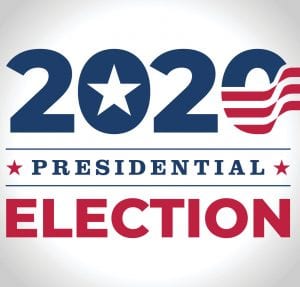Political Science Faculty Weigh in on 2020 Election

The world has been watching the build-up to the U.S. presidential election for months now. The candidates and their platforms, the Electoral College and, in 2020, allegations of potential voter fraud are all of intense interest to international media.
To find out what topics international media are interested in, we spoke with three faculty members from the School of Politics, Security, and International Affairs (SPSIA):
- Aubrey Jewett, Ph.D. (Associate Professor)
- John Hanley, Ph.D. (Lecturer)
- Daniel Marien, Ph.D. (Associate Lecturer)
Below are the viewpoints of these three faculty members on what it’s like interviewing with foreign journalists.(Responses have been edited for brevity and clarity.)
COS: How do you explain the electoral college and Florida’s role in the election?
Aubrey Jewett: I’m most frequently asked, “Why is Florida so important in U.S. presidential elections?” They always want to know that as part of the story regardless of the specific angle they are covering.
Florida’s political value to recent presidential campaigns is a result of several factors. Florida is a populous state with the third largest number of (electoral college) votes and the most electoral votes (29) of any battleground state. (Many states are reliably Republican or reliably Democratic, but only about a dozen states are competitive – these are also called ‘swing states’). The Sunshine State is a swing state with a perfect record of voting for the winning president since 1996; It has voted three times for a Democrat and three times for Republican and all six times for the winner (only one other state has done that).
John Hanley: Audiences know Florida from the 2000 recount — reinforced by the state’s visibility as a tourist destination — so they are interested in where the race stands here as a bellwether for what is going to happen. That depends a little on the day, but the general answer is that there has been a fairly consistent Biden lead. Trump has tried a bunch of different attacks on Biden throughout the campaign, but none has paid off yet, and he is running out of time. The polling suggests that seniors have been pulling away from Trump, as have more educated and high-income voters. The gender gap is really big. At the same time, we are seeing some movement to Trump among African Americans, Latinos, and lower-education voters. So, in Florida especially, it’s going to come down to how motivated each of these groups are to turn out.
Daniel Marien: Canada’s voting procedures in national elections are much simpler (uniformity across the country, technical simplicity and reliability of paper ballots, ease of registration). There are also no partisan efforts at suppressing the voting participation of specific populations.
Therefore, there is a need to explain and describe the voting procedures, their variability by state, issues with access to the ballots, the role of the Electoral Colleges, the registration process, etc. (Canadians are typically surprised to learn that U.S. voters may declare a party affiliation when registering.)
COS: What kind of questions do you get about campaigns and public events?
John Hanley: Debates are a big topic. You get questions like “What does Biden/Trump need to do in this debate,” or the BBC asked, “What was the effect of the second debate being canceled?” Debates are a big focal point, but rarely move the needle much because most voters see candidates through their own beliefs and partisanship. In the first 2012 debate, for instance, Mitt Romney beat President Barack Obama pretty badly, but most Democrats still thought Obama had won.
Daniel Marien: Canadian media pay much attention to these debates. They are broadcast directly on both the English and the French language national news networks (CBC News and Radio-Canada RDI).
I stress that TV debates rarely change the distribution of public opinion, that much lies and distortions are stated by candidates during these debates and that one needs to consult fact-checkers after the debates to gain a more accurate picture of issues and candidates’ positions.
Watch the interviews below:
Daniel Marien, communicates frequently with Canadian media. Since Labor Day through Nov. 4, he has been scheduled for nine radio interviews with local morning programs in Montreal, Quebec City and one for the national network. He has also completed five TV interviews (over Skype) with Radio-Canada’s program Le Telejournal avec Pascale Nadeau.
Aubrey Jewett, is one of the most prolifically interviewed faculty members at UCF. Here are some of his international interviews.
Canada – https://ici.radio-canada.ca/nouvelle/1741769/covid-floride-disney-magie
Sweden – https://www.svd.se/har-star-striden-som-kan-leda-till-vita-huset
Britain – https://www.thetimes.co.uk/article/floridas-tide-of-grey-voters-is-turning-against-trump-fxhjmfj7n
John Hanley, has an interview recently with the United Kingdom’s BBC Breakfast.
